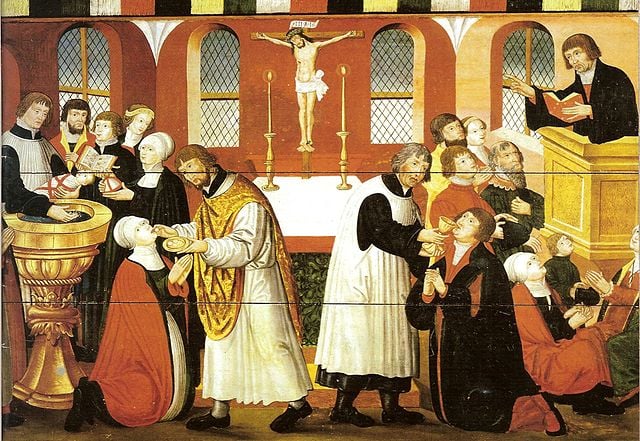+ Luther Expert James Swan’s and Luther’s Works Editors’ Confusion as to Luther’s Position

Martin Luther, the founder of Protestantism, believed that there were only two sacraments (not seven). And he believed that there were more than two. If you’re confused by the previous two sentences, you should be. Luther was quite capable of both vacillation and believing several contradictory things at the same time. So why should the issue of sacramentalism be any different?
I’m writing about this because I ran across an article (11-12-18) by Luther apologist and anti-Catholic Reformed Protestant James Swan (words in green below, while Luther’s will be in blue), who exhibits similar confusion. He should know better than that, having been engaged in exhaustive Luther research for years, but alas, it’s not the case.
I have done this research, in my critical book about Luther, a second book in which I document massive instances where he agrees with Catholic teaching, and on my comprehensive Martin Luther web page. I did more today as well (utilizing my 55-volume hardcover set of Luther’s Works, among other resources in my personal library), to nail down my argument in this regard.
Swan calls his post, “Luther Maintained that Penance was a Sacrament?” In it, he goes after “one of Rome’s defenders.” Swan opines:
I’m not sure which “Luther” you’re referring to. The one from the 16th century only held to there being two sacraments: baptism and the Lord’s Supper.
Nevertheless, it has seemed proper to restrict the name of sacrament to those promises which have signs attached to them. The remainder, not being bound to signs, are bare promises. Hence there are, strictly speaking, but two sacraments in the church of God—baptism and the bread. For only in these two do we find both the divinely instituted sign and the promise of forgiveness of sins. The sacrament of penance, which I added to these two, lacks the divinely instituted visible sign, and is, as I have said, nothing but a way and a return to baptism. (LW [i.e., Luther’s Works] 36:124)What’s interesting about this quote (at least to me) is that earlier in the same writing, he said penance was a sacrament (LW 36:21-22), but by the end of the treatise, he had changed his mind (the quote above). The editors of LW note: “Penance he would retain in purified form, but not as a sacrament, because it lacks a visible sign appointed by God; however, he strongly rejects priestly absolution” (LW 36:7-8). While Luther denied that penance was a sacrament, I recall he still confessed his sins the rest of his life. . . .
See Luther’s discussion in The Babylonian Captivity of the Church (1520). Earlier in this writing, he allows for penance to be a sacrament, by the end he had changed his mind. That’s hardly “maintained.”
Luther’s “strictly speaking” appears to be somewhat of a “loophole” in his thought, and may perhaps explain some of his self-contradiction. He definitely moved further away from Catholicism as time went on: generally speaking, but by no means in every particular. In other ways, he became more traditional: such as in his ongoing battles with the Zwinglians, iconoclasts such as Karlstadt, and Anabaptists.
Swan cites Luther from Babylonian Captivity. It’s not totally clear that he asserts the sacramental status of penance on pages 21-22 (possibly). A mere year before, however, he clearly regarded penance as a sacrament:
For the sacrament of penance (of which we have already spoken) also has its foundation in this sacrament, inasmuch as sins are forgiven only to those who are baptised, to those whose sins God has promised to forgive. The sacrament of penance thus renews and points out again the sacrament of baptism. It is as if the priest, in the absolution, were saying, “Lo, God has now forgiven you your sin, as He long since promised you in baptism, and now he has commanded me, by the power of the keys, to assure you of t his forgiveness. Therefore, you now come again into that which baptism is and does. Believe, and you have it. Doubt, and you are lost.[”] (The Holy and Blessed Sacrament of Baptism, Nov. 1519; translated by C. M. Jacobs; in Works of Martin Luther, vol. 1, Philadelphia: A. J. Holman Company, 1915, p.65, my bolding. I actually cite the “revised” translation from Works of Luther, vol. 35, p. 38. It lacks the closed quotation mark)
Note that this is a full two years since Luther nailed his 95 Theses to the door of the church in Wittenberg (which is considered the beginning of Lutheranism and Protestantism). It’s “early” in his development, granted, but he has still in essence been a Protestant in his thinking for two years. By the next year, he had rejected at least fifty Catholic doctrines or practices, as I have documented: even before he was excommunicated.
Thus (if I may indulge in an important “footnote” diversion for a moment), it’s not accurate to say that he was “forced out” of the Church. He had decided that he wanted to reject fifty things about Catholicism. It was his free decision. The Church merely called a spade a spade the next year, in 1521. It couldn’t pretend that he was a Catholic in good standing, with all that baggage.
Yet it’s widely claimed by Protestant defenders of Luther and the so-called “Reformation” that we forced out an obedient, reluctant monk who was only trying to be a good Catholic and was opposing only the extreme errors of sales of indulgences and whoring priests, etc. Poppycock! The actual historical truth of things is always more complex and more interesting than the myths that cynical people invent or uncritically believe.
In “about mid-October, 1519” Luther produced a work called, The Sacrament of Penance (pp. 9-22 in Luther’s Works, vol. 35), in which he repeatedly refers to the “sacrament” or “holy sacrament” of penance. In the Introduction to the work in that volume (my quote is from pp. 5-6), it’s stated that:
Luther could, at this time, find authority for retaining at most three [sacraments]: penance, baptism, and the Lord’s Supper. . . .
By 1520 Luther was to reduce the number of sacraments to two, and omit penance because it lacked a divinely instituted visible sign.
Then on p. 10, footnote 6, the editors observe: “Within a year Luther had excluded penance from the list of sacraments.”
That’s a fascinating opinion, since over a year later (December 1520), Luther was still referring to the “sacrament” of penance:
So also the divine sign, or sacrament, of penance is given in virtue of Christ’s word in Matthew 16:19, “Whatsoever thou shalt loose on earth shall be loosed in heaven, etc.” Therefore, he that goes to confession and does penance must see to it, before all else, that he hold this word to be the truth and firmly believe that he is “loosed” before God in heaven when he is absolved on earth. . . . Everyone knows that the priest’s absolution is a verdict — not his own, but God’s — which demands faith, by virtue of Christ’s word, “Whatsoever thou shalt loose on earth shall be loosed in heaven.” Matthew 16:19 The priest says, “I absolve thee”; that is to say, “I loose thee,” or “Thy sins are forgiven thee.” (An Argument in Defense of All the Articles of Dr. Martin Luther Wrongly Condemned in the Roman Bull, Dec. 1520; translated by C. M. Jacobs; in Works of Martin Luther, Volume 3 [Philadelphia: A. J. Holman Co. and The Castle Press: 1930]; my bolding )
If that weren’t enough to convince the inquirer of the confusion and contradictoriness of Luther on this question, we have evidence from 1528:
Penance also is to be reckoned as a sacrament – all sacraments are a kind of penance. There are other reasons, too, for calling it a sacrament, but they need not be recounted here. (Instructions for the Visitors of Parish Pastors in Electoral Saxony, Jan. 1528, translated by Conrad Bergendoff; in Luther’s Works, vol. 40, p. 293; my bolding)
Note about the above:
Melanchthon was the author of the Instructions, but Luther’s ideas underlie the whole and some passages reflect his pen. Because of the endorsement of it by Luther, and the fact that he not only wrote the preface but made many revisions in later editions, the work is generally included in the works of Luther. (Introduction to the piece in Luther’s Works, p. 266)
Moreover, Luther, in his Large Catechism of April 1529, reiterates the same:
Baptism, both by its power and by its signification, comprehends also the third sacrament, formerly called Penance, which is really nothing else than Baptism. (section: “Infant Baptism”: IV, 74; p. 89 in this edition, translated by Robert H. Fischer, and published in Philadelphia by Fortress Press in 1959; see also the version in the online Book of Concord: “the third Sacrament, which has been called repentance”)
Why is he still talking a “third sacrament” of penance in 1528 and 1529 if he thinks there are only two? Why not be done with this language altogether? And how is it that the Lutheran Luther scholars who edited and translated Luther’s Works got this fact wrong, as well as zealous ostensibly “confident and assured” Luther defender James Swan? It takes a Catholic apologist like me to discover and document it? Life is strange, ain’t it?
Luther’s successor and best friend Philip Melanchthon also asserted that penance was a sacrament (though defining sacrament a bit differently) in his 1531 Apology of the Augsburg Confession, which is part of the Book of Concord that serves as Lutheran doctrinal orthodoxy.
Martin Luther’s Treatise on the New Testament dates from August 1520 (Babylonian Captivity was published in October). Luther could still, at this time, refer to five sacraments, and insinuate more, in his “etc.” (perhaps even seven):
For, to be brief and to the point, we must let the mass be a sacrament and testament, and this is not and cannot be a sacrifice any more than the other sacraments — baptism, confirmation, penance, extreme unction, etc. — are sacrifices. (p. 312 in my online citation)
Again, this is “early Luther” but it’s significant in that it was about two years and nine months after his 95 Theses. He refers to extreme unction in the same work (p. 309):
Now just as I cannot receive or give the sacrament of baptism, of penance, or of extreme unction in any one’s stead or for his benefit, but I take for myself alone the blessing therein offered by God . . .
Even after technically rejecting them as sacraments, Luther continued to urge the practices of confirmation, confession, and extreme unction, as beneficial and not contrary to orthodox Christianity in the Lutheran sense.
Gordon W. Lathrop, Professor of Liturgy Emeritus, Lutheran Theological Seminary at Philadelphia, and Visiting Professor of Liturgical Studies, Yale Divinity School, observed about Luther’s fluid view of sacraments:
Neither does Luther insist . . . that there are only two sacraments. This is one of the many places where systematizing Luther does not work. In one place in Luther’s writing there will be two sacraments. In another, three—including penance or absolution—or even four—including “the mutual conversation and consolation of the brothers and sisters.” In another, only one, Christ himself, manifested and encountered in all the others. In his essay On the Councils and the Church [completed in March 1539] (LW 41:148-166), Luther argues that one can tell that an assembly is Christ’s church by the presence of seven “signs of life” (that is, signs of God’s life among us, giving life). These are: the preached word of God, baptism, the Lord’s Supper, the use of absolution, the calling and consecrating of ministers, the public use of thanksgiving and prayer, and what he calls “the holy possession of the cross,” that is the presence of suffering and the absence of triumphalism as a mark of communal life. It is a remarkable and still useful list. And that list does not support some easy idea of “only two sacraments.” (“Martin Luther and the Sacraments: A Response to Roland Millare’s ‘Honest Assessment’ “, 10-22-13, Pray Tell: Worship, Wit & Wisdom)
In this work, Luther virtually asserts all the essential aspects of the sacrament of ordination, while not using the word “sacrament”:
[T]he church is recognized externally by the fact that it consecrates or calls ministers, or has offices that it is to administer. There must be bishops, pastors, or preachers, who publicly and privately give, administer, and use the aforementioned four things or holy possessions [preaching the Bible, baptism, Eucharist, and the keys, or penance / absolution] in behalf of and in the name of the church, or rather by reason of their institution by Christ . . . The people as a whole cannot do these things, but must entrust or have them entrusted to one person. . . . he alone should be allowed to preach, to baptize, to absolve, and to administer the sacraments. (Ibid., p. 154)
In referring to absolution / penance / “the keys” Luther uses very sacramental language (remember, this is in 1539: seven years before he died):
[I]f the keys are not present for Christ, God’s people are not present. Christ bequeathed them as a public sign and a holy possession, whereby the Holy Spirit again sanctifies the fallen sinners redeemed by Christ’s death, and whereby the Christians confess that they are a holy people in this world under Christ. (Ibid., p. 153)
***
Photo credit: Martin Luther Preaching, from the Altarpiece of the Church of Torslunde, 1561 [public domain / Wikimedia Commons]
***













